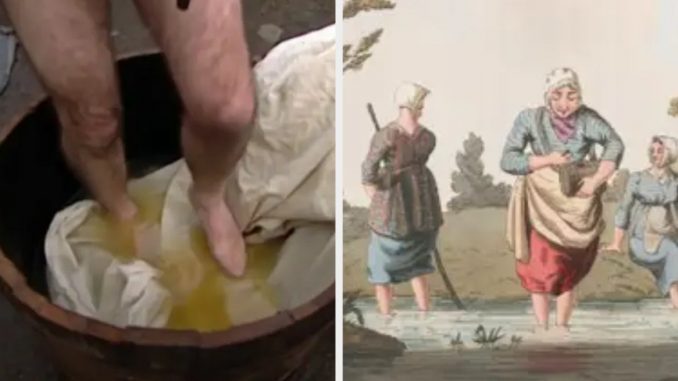
[ad_1]
I’ll never hear the phrase “nit-picking” the same way again.
1.
Want to change the way you think about fabric conditioner forever? Look no further than the work of wool fullers, who used to soften their cloth using bodily waste.
BBC
Chances are you own at least one woollen item, but you probably haven’t thought about how intensive the process of turning sheep’s coats into clothing is. You know who was very aware of the labour involved, though? Fullers, who worked throughout history from Ancient Rome to 15th century England. Untreated wool is oily, greasy, and dirty, and it has a coarse and scratchy finish that’s way too harsh to wear. Back in the day, fullers used to soften the fibres by trampling over them in vats filled with aged urine (side note: old pee used to be used for everything from whitening teeth to softening leather). The ammonia-rich environment really did banish the grease from wool, but it meant that somebody had to spend up to eight hours trampling up and down in a bucket of foul fluid!
2.
Arming squires were in charge of keeping a knight’s armour up to scratch, even while he was using it.
powerofforever / Getty Images / Via digi.ub.uni-heidelberg.de
You know those people who remove and replace tyres on Formula One cars faster than most of us can drive? Well, an arming squire was basically the Medieval equivalent of that! Their job involved maintaining, fixing, and applying a knight’s armour, sometimes mid-battle (and no, they didn’t wear any armour themselves as they rushed into the scuffle). To add insult to injury, arming squires also had to remove the blood, sweat, mud, and other mess from the armour after a fight – oh, and of course they were given aged urine as a cleaning agent.
6.
Ever looked down the back of your sofa for some misplaced coins? Well, the work of a tosher was basically a far grosser version of that (if you replace ‘sofa’ with ‘sewer’ and sub ‘coins’ for ‘rags and scrap metal’, that is).
Universal History Archive / Getty Images
7.
The work of a plague bearer was pretty much exactly as grim as it sounds.
Duncan1890 / Getty Images
8.
If you were a social-climber in the royal court of England, you probably aspired to attain the coveted position of the groom of the stool one day (even though the job itself was literally crap).
9.
Want to reach heaven after death without having to worry about those pesky lil’ sins holding your soul back? Well, folks in the 18th century had a solution – your loved ones could hire the local sin eater to absorb all your wrongdoings.
National Geographic / Via youtube.com
These workers took on the misdeeds of the deceased by eating some bread that had been placed on the dead person’s chest. Sure, it sounds a little wild to us now, but back then the process was seriously heavy stuff – the writer John Bagford described a sin eater as “pawn(ing) his own soul” for a “groat” (fourpence). Professional sin eaters were especially common in Wales, often soaking up the mortal wrongdoings of hundreds of people.
10.
Your 3pm slump has nothing on the drowsiness that lime burners faced after spending hours extracting carbon monoxide from rocks.
United Archives / Getty Images
11.
Rag and bone men would collect pretty much anything that people didn’t want to keep (and I mean anything).
12.
If the prospect of going on a treadmill sounds torturous to you, imagine having to stay on it for hours at a time to grind corn or mill water that you’ll never even use. That was the reality for Victorian treadmillers!
Universalimagesgroup / Getty Images / Via bl.uk
14.
Herring girls were groups of women who travelled along the coast of Britain, following the migration of herring to help trawlermen preserve and prepare their catch.
Daily Herald Archive / Getty Images
Their job included gutting and salting herrings at record speed for up to fifteen hours (they were paid per barrel, so the faster workers made more money). Herring girls would try to protect their hands from the inevitable cuts that come from handling sharp knives and bones by using cloths and flour, but it didn’t work and injuries would often become infected. As if all that wasn’t enough, the workers would be denied access to hotels and even their own homes thanks to the foul smell of fish!
15.
Forget about finding a needle in a haystack – oakum pickers used to have to unravel entire ropes in search of specific fibres.
16.
Petardiers certainly kicked off their careers with a bang – the position involved placing heavy, fragile bombs as close to your enemy defences as possible.
Simple History / YouTube / Via youtube.com
If you haven’t heard of a petardier yet, it’s probably because the position only existed during late Medieval and early Renaissance times (and also because most petardiers didn’t live to talk about their position). The job involved teams of around seven men placing ‘petards’, a rudimentary kind of bomb, as close to their enemy’s defence lines as possible during sieges (think fortress walls, tunnels, and more). Oh, and if they weren’t already worried about enemy fire, the 100-pound petard itself was liable to explode at pretty much any given time – hence the phrase ‘hoisted by his own petard’.
18.
Feel like you deal with a lot of crap at work? Try telling that to a gong farmer.
Ilbusca / Getty Images
When you think of Tudor achievements, a few things might come to mind: gorgeous dresses, glamorous knights, and stunning houses, for example. Plumbing, however, was not a great feature of the age – in fact, most people did their business in communal latrines called cesspits. Of course those massive piles of vile substances didn’t clean themselves, and seeing as parts of London only had 16 latrines per 30,000 people in the 14th century the job of waste removal became vital! Gong farmers were hired to take the mess away at night, charging local councils two measly shillings per tonne of removal. The dangerous job was brimming with bacteria, and it sounds like it might just have been one of the smelliest tasks of the day!
Hat tip to Henry Mayhew’s incredible 1851 book, London Labour and the London Poor, for many of these facts. The book is in the public domain – you can view it by clicking here!
Nostalgia Trip
Take a trip down memory lane that’ll make you feel nostalgia AF
[ad_2]
Source link








Leave a Reply